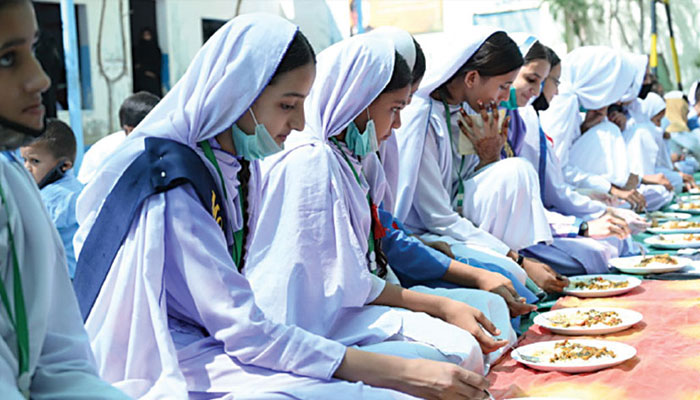Punjab school meal programme helps reduce malnutrition
Student attendance has risen significantly since program’s inception
LAHORE: Punjab Chief Minister Maryam Nawaz’s ‘School meal program’ has helped reduce malnutrition among students. In its first phase, the program saved Rs1.780 billion while impacting the health and well-being of thousands of children.
The program has also witnessed remarkable success in boosting school enrolment. Within months of its initiation, over 55,000 new students enrolled in schools, demonstrating the program’s positive effect on student attendance and engagement. In addition, the initiative provided 40 million milk packs to schools in Muzaffargarh, Rajanpur, and Dera Ghazi Khan, benefiting more than 35 million students in these districts.
Student attendance has risen significantly since the program’s inception, with the number of students increasing from 361,000 to 416,000. The chief minister has directed that the ‘School meal program’ be extended to more remote districts in south Punjab.
Meanwhile, Chief Minister Maryam Nawaz expressed her heartfelt gratitude for the successful culmination of the ‘Jaffar Express Operation’ and paid tribute to the security forces involved in the operation. She also honoured the brave soldiers who sacrificed their lives during the operation, highlighting their courage and commitment to the nation’s security.
She condemned the terrorists who used innocent passengers, including women and children, as human shields, describing such actions as a cowardly act and asserted, “The terrorists consigned to hell have become symbols of disgrace.”
-
 ‘Narcissist’ Andrew Still Feels ‘invincible’ After Exile
‘Narcissist’ Andrew Still Feels ‘invincible’ After Exile -
 Shamed Andrew ‘mental State’ Under Scrutiny Amid Difficult Time
Shamed Andrew ‘mental State’ Under Scrutiny Amid Difficult Time -
 Bad Bunny's Super Bowl Halftime Show: What Time Will He Perform Tonight?
Bad Bunny's Super Bowl Halftime Show: What Time Will He Perform Tonight? -
 Where Is Super Bowl 2026 Taking Place? Everything To Know About The NFL Showdown
Where Is Super Bowl 2026 Taking Place? Everything To Know About The NFL Showdown -
 Chris Pratt Explains Why He And Katherine Schwarzenegger Did Premarital Counseling
Chris Pratt Explains Why He And Katherine Schwarzenegger Did Premarital Counseling -
 Drake 'turns Down' Chance To Hit Back At Kendrick Lamar At Super Bowl
Drake 'turns Down' Chance To Hit Back At Kendrick Lamar At Super Bowl -
 Sarah Ferguson Had A ‘psychosexual Network’ With Jeffrey Epstein
Sarah Ferguson Had A ‘psychosexual Network’ With Jeffrey Epstein -
 Miranda Kerr Shares The One Wellness Practice She Does With Her Kids
Miranda Kerr Shares The One Wellness Practice She Does With Her Kids -
 Czech Republic Supports Social Media Ban For Under-15
Czech Republic Supports Social Media Ban For Under-15 -
 Khloe Kardashian Shares How She And Her Sisters Handle Money Between Themselves
Khloe Kardashian Shares How She And Her Sisters Handle Money Between Themselves -
 Prince William Ready To End 'shielding' Of ‘disgraced’ Andrew Amid Epstein Scandal
Prince William Ready To End 'shielding' Of ‘disgraced’ Andrew Amid Epstein Scandal -
 Chris Hemsworth Hailed By Halle Berry For Sweet Gesture
Chris Hemsworth Hailed By Halle Berry For Sweet Gesture -
 Blac Chyna Reveals Her New Approach To Love, Healing After Recent Heartbreak
Blac Chyna Reveals Her New Approach To Love, Healing After Recent Heartbreak -
 Royal Family's Approach To Deal With Andrew Finally Revealed
Royal Family's Approach To Deal With Andrew Finally Revealed -
 Super Bowl Weekend Deals Blow To 'Melania' Documentary's Box Office
Super Bowl Weekend Deals Blow To 'Melania' Documentary's Box Office -
 Meghan Markle Shares Glitzy Clips From Fifteen Percent Pledge Gala
Meghan Markle Shares Glitzy Clips From Fifteen Percent Pledge Gala




